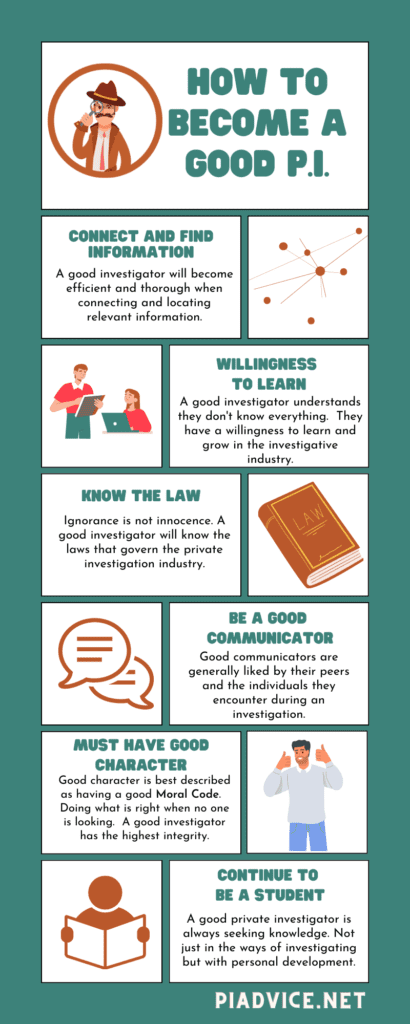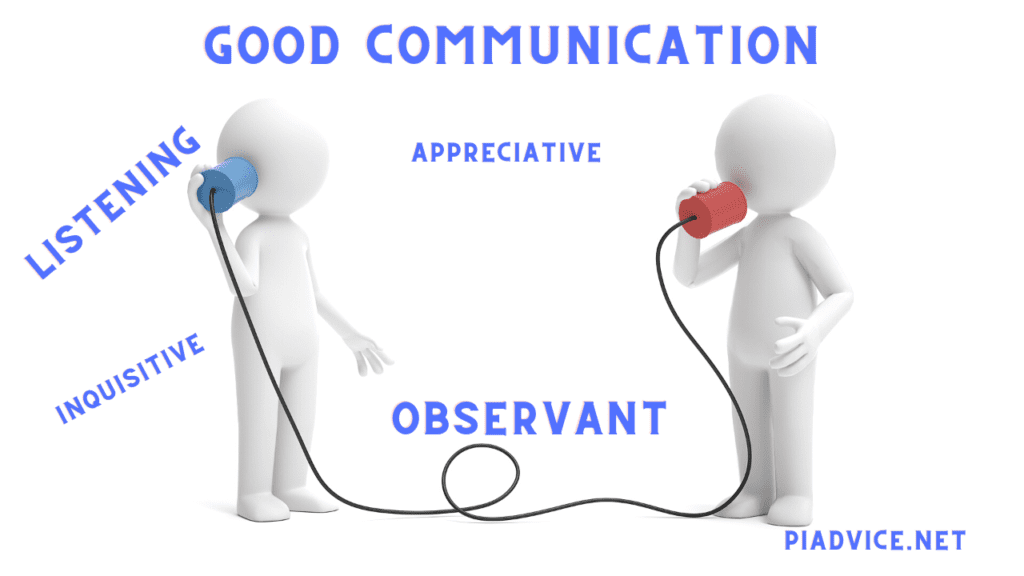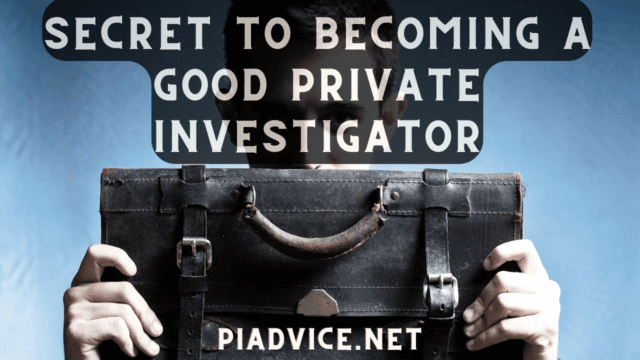Working as a private investigator does not make you a good private investigator. There are plenty of private investigators that have been licensed for years but are still not very good at the job itself. Just because an individual works for an investigation company and has a video camera or covert camera, doesn’t make them good at it.
Just like if someone is handed a paintbrush and paint, this does not make this person a good painter.
The threshold to becoming a private investigator is very low. If you want to know more about how to become a private investigator, you can read more about that here.
Below I will share with you how to become a Good private investigator. It’s not just one aspect of being an investigator that is important. There are a lot of areas that make a good private investigator.

Contents
- 1 Good Investigators Will Go down Rabbit Holes (Sometimes)
- 2 Good Investigators Learn How to Connect and Find Information
- 3 A Good Private Investigator is Willing to Learn the Craft
- 4 Good Investigator Will Use Multiple Resources
- 5 Good Private Investigators Are Open to Feedback
- 6 Know Laws that Affect Private Investigators
- 7 Have Good Character
- 8 Must Be a Good Communicator
- 9 Listening Well
- 10 Good Communicators Are More Friendly
- 11 Be an Observant Communicator
- 12 A Good Investigator is Appreciative
- 13 Be an Inquisitive Communicator
- 14 A Good Private Investigator Sets Clear Expectations
- 15 A Good Private Investigator Continues to Be a Student
Good Investigators Will Go down Rabbit Holes (Sometimes)
Investigators have to be mindful of their time especially as it relates to what they can actually bill the client for. However, sometimes it is important to go down trails of information to see where it leads. This can be case-dependent sometimes.
A good investigator will manage their time efficiently when chasing information as it has to make sense to chase.
Sometimes it won’t make sense to chase information that will have no bearing on the outcome of the investigation.

Good Investigators Learn How to Connect and Find Information
Sometimes you will have to connect dots that aren’t easily observed. Those rabbit holes sometimes help you connect the dots.
A good investigator will think of creative ways (that are legal) to find individuals or information relevant to an assignment.
Some of this is learned by watching other investigators and some of this is developed over time by experience.
Some types of investigations have patterns of behavior that you will know how to work. But more times than not, every new assignment comes with unique challenges.
Talk to others in the industry frequently about how they worked their files. How did they connect information? How did they find that information? Who did they talk to? What pretexts (if any) were used? How did they converse with others in those situations?
As you get better at this skill of finding information the more you will be worth to the company you work for or the client who hires you.
A Good Private Investigator is Willing to Learn the Craft
If a new investigator truly wants to be good at the craft of investigating, they must have a willingness to learn. Many investigators come into the industry believing they know all they need to know because that has entered from law enforcement or a similar industry.
I have personally observed individuals that reject the idea that they have something to learn, which directly reflects the poor outcomes of assignments they are assigned to.
And the response to poor outcomes for these sorts of investigators is justifying or rationalizing how it was not their fault. The blame will typically be directed elsewhere other than reflecting on their actions.
If you are humble, observant, and have the willingness to learn, you will end your investigation career as a much better investigator than when you started.
Good Investigator Will Use Multiple Resources
Technology has really changed over the last 20 years and so has access to information for investigators. New free and paid resources are always popping up.
Investigators can sometimes get too comfortable with using the same resources for all situations.
What ends up happening is investigators will eventually reach a dead end because there are more resources to explore that they aren’t exploring.
One of the best ways to find out what the best resources are is to stay connected with other investigators. Generally speaking, investigators are pretty open about sharing where they find information with other investigators and how reliable they feel that information is based on their experiences.
You got to have access to as many resources as you can to be an efficient and effective private investigator.

Good Private Investigators Are Open to Feedback
This category is very similar to the previous one but is still important for a private investigator to grow no matter how long you have been in the industry.
It should be relatively easy to receive feedback especially if you are new to the industry. You are still being molded and shaped by your mentors. Considering feedback from a variety of people will help you become better at what you do.
If you are a senior investigator you may be in a management or training role if not a private investigation business owner.
Feedback allows for someone to learn about their weaknesses from a perspective other than their own. Feedback allows someone to learn how their actions affect others.
In the investigative sense, feedback can help a surveillance investigator know where they went wrong and different steps to be better on the next surveillance.
Investigator Feeback can also help an investigator be more aware and put an emphasis on personal development which is incredibly important for a private investigator.

Know Laws that Affect Private Investigators
To be a competent investigator, an investigator must know the laws that govern the private investigation occupation. It should be one of the first things a private investigator is introduced to.
It is important to understand that ignorance is not innocent. Preparing yourself with this knowledge will help you avoid illegal situations that a client or even a manager of an investigation company may try to get you involved in.
If you are a private investigator working for an investigation company, rest assured that they will not protect you if you do something illegal and action is taken against you. They will distance themselves from you even if they told you to do said “illegal” thing.
These would be laws associated with but not limited to:
- Privacy
- Stalking
- Pretexting
- Represented individuals
- Rough Shadowing
- Trespassing
- HIPPA Laws
- GPS Tracking
- Drone Laws
- Entrapment (Roping)
I have written extensively about pretext laws if you are interested in reading more about that topic here.

Have Good Character
Character is best described as the quality of your moral code. A person with good character is easy to trust. A person with excellent character will do the right thing when no one is looking. And as a private investigator, no one is looking a lot because private investigators will work alone most of the time.
“The true test of a man’s character is what he does when no one is watching.”
John Wooden
A person with good character has high integrity. This would be someone who might reveal a mistake even though no one else discovered the mistake.
When someone can identify an investigator who has good character, it is much easier to trust the investigator. Trust can be within the investigation organization or it can relate to the people an investigator interacts with.

Must Be a Good Communicator
Investigators that can communicate effectively are usually well-liked by their peers and by the people they interact with throughout the course of an investigation.
Good Communicators Have The Following Characteristics:
- Listen well
- Are Friendly
- Are Observant
- Appreciative
- Inquisitive
- Set Clear Expectations
Listening Well
Good communicators listen more than they talk which is especially important as an investigator. Good private investigators are able to ask good questions because they listen intently for follow-up questions, clarify questions, and ask open-ended questions.
When someone feels as though they are being heard or understood, it builds trust between the investigator and the person they are communicating with (because you spend more time listening than talking).
This is important not just with clients and individuals you speak to through an investigation but also with the people at the investigation agency you work at.
Good Communicators Are More Friendly
If you communicate well with patience, empathy, and understanding, you will be perceived as friendly. Friendly people are much more approachable than those people perceive as not friendly or hostile.
Some investigators attempt to communicate with authority to get what they want however usually it provides the opposite response as individuals they speak to like this will put up a wall.
Being friendly and approachable will help bring down walls and an investigator is much more likely to get further with people in dialog and trust.
Be an Observant Communicator
Being an observant communicator means you are watching and listening to how someone responds or reacts.
Being observant will allow you to see when someone is becoming defensive or when someone is disconnecting from the conversation. This will allow you to change strategies in your conversation to put down their walls or reengage.
Being an Observant Communicator also allows for potentially seeing deception in the course of a conversation or interview.
A great course is with Wicklander-Zulawksi & Associates with interview and interrogation courses.
When talking to individuals it is much easier to be observant with video calls or in-person communication as it allows you to see posture and facial expressions which is incredibly helpful when wanting to be observant.
A Good Investigator is Appreciative
Showing appreciation even in small ways can go a long way with people in the course of investigations and in other areas of an investigator’s life.
Everyone wants to feel loved, cared about, and important. If you can make people feel that way, it will help you in many areas.
So how can you make clients feel appreciated? You can send them a nice note with maybe a small gift card for coffee or dinner.
Saying something like, “Thank you for trusting us with your assignments. Our investigators are thankful to be able to serve you to the best of our abilities. We are all honored to serve you.”
With investigation staff, a similar gesture can go a long way. But sometimes even just thanking an investigator on a call. By pointing out what they are doing well and thanking them for their hard work, investigators will respond positively to that.
Throughout an investigation, showing appreciation to witnesses or individuals that point an investigator in the right direction can go a long way. Truly thanking them for their assistance will in some cases make those individuals more likely to go out of their way to help even more if new information arises.
Be an Inquisitive Communicator
To be a good private investigator you must become effective at asking good questions. When conducting recorded interviews this is particularly important.
Using questions like, “Tell me more about that,” is a fantastic question to explore topics that someone shares limited information about.
The more questions you ask (good ones), the more directions the line of questioning may go and the more information that can be collected.
A good private investigator asks good questions.
A Good Private Investigator Sets Clear Expectations
When expectations are set, people know what to expect.
With a client, you may explain where the investigation might lead or not lead and the reasons why. This can lower expectations and disappointment.
When setting up or conducting interviews with individuals, let them know what to expect and the reason for the interviews will lower their walls and make them more comfortable speaking with a private investigator.
As an investigation agency owner or manager, being able to communicate well with clients or field investigators is essential as well.
Being able to build rapport and trust with clients will make them feel more comfortable and over time trust will develop. A good communicator will take interest in their clients If you build relationships (friendships) with clients they will be more likely to give you grace when an assignment does go to plan or when mistakes are made.
As a manager or owner, communicating well with field investigators will help get the most out of those investigators. Investigators who like who they work for (managers or company) will usually work harder and stay with the company longer.
A Good Private Investigator Continues to Be a Student
Above all, to become a good private investigator you must continue to be a student.
Great private investigators continue to try to improve themselves through ongoing education, seminars, connecting with the investigative community, and work on personal development.
Great investigators work on their investigative skills, work on their interview skills, work on their surveillance skills, work on their communication skills, and work on personal development.
Don’t settle for the status quo as a person or private investigator. If you do, you are doing a disservice to yourself and the individuals you interact with.
I recommend private investigator books you should take a look at to improve yourself and the qualities of a good private investigator.
Keep working on yourself and you will be the best private investigator you are capable of being.
Recent Posts
Hawaii is probably one of the most interesting states to work as a private investigator if you are not used to the culture or a native of the state. And if you are not a local, that is something...
How to become a private investigator in Georgia

